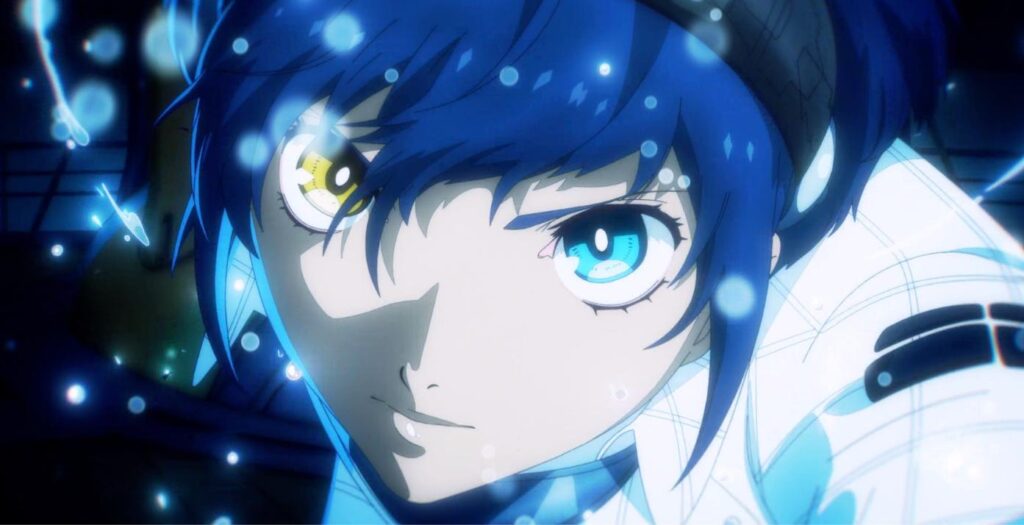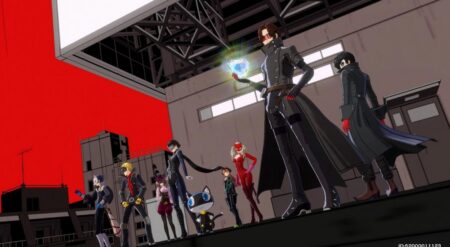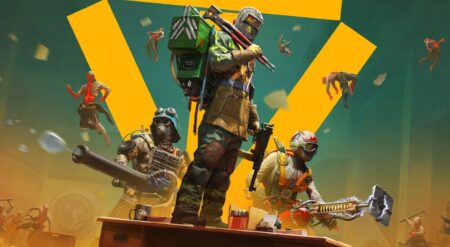“Is fantasy limited to the confines of imagination? Would you call it a powerless creation?” These are the first questions Metaphor: Refantazio posits to the player in the game’s opening moments. They are questions that Studio Zero’s newest RPG wrestles with over the course of its 70-hour runtime and ones that left me with a newfound optimism for the power of how fantasy storytelling can affect reality, and vice versa.
Metaphor: ReFantazio puts players in the shoes of a young boy on a quest for the throne after the assassination of the king. The only living heir secretly hides away as cursed thorns consume his body. All while the power vacuum created by the king’s death opens the door for anyone to seize power as the new king in the midst of chaos and unrest.
The early hours of Metaphor dive immediately into the complexities of its world. How racism, class disparity, and religious extremism run rampant and seep into the foundational pillars of society. As your protagonist enters the capital city of Gran Trad, he’s greeted with scowls, snide remarks about his Elda race, and general disdain for his kind. Other races like the Paripus – looked down upon and marked as hedonists – line the city’s stone-cobbled streets, looking for help with no one to turn to.
Metaphor doesn’t shy away from the ugliness of its world, in fact, it uses it as a driving force. The game reminds the player that change doesn’t happen overnight and that it can’t happen without people doing more than the bare minimum to enact real change in the world.
Coming up against a real-life US election may be a mere coincidence, but Metaphor wears its aspirations on its sleeve. It feels more poignant than ever because it often takes the risk of saying the quiet part out aloud. Putting the power to anoint the next ruler through the will of the people means that we have to grapple with how elections are won and, more importantly, how we engage one another in difficult conversations. We must face them head-on instead of shying away from radical ideals of change and collective action.
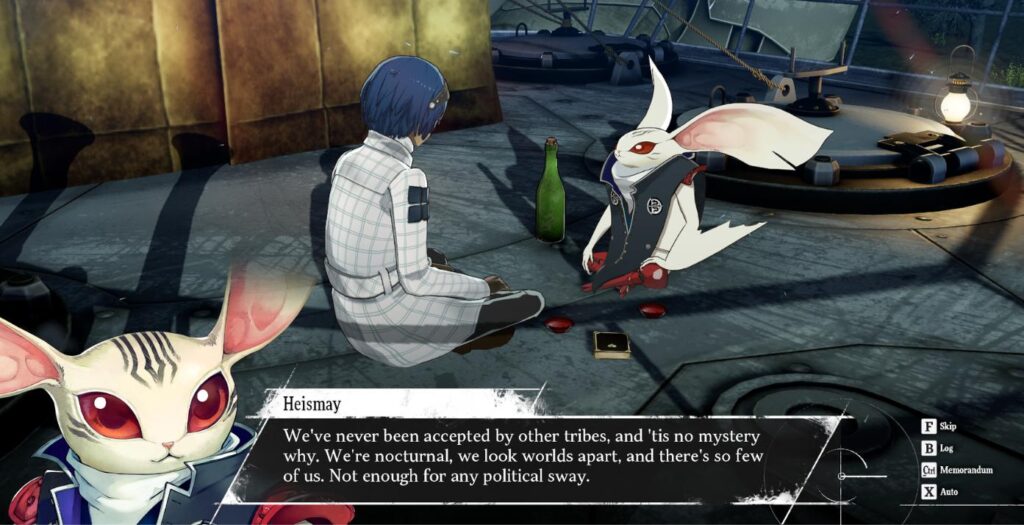
It’s one thing to acknowledge that change comes from the people, and it’s another to call upon people to build toward a more accepting future through shared compassion, empathy, and understanding. It’s not just about putting a new ruler into power but acknowledging that a governing body is meant to answer to the masses, and through using our collective voice, we can make real foundational changes.
For a game called Metaphor, it is relatively straightforward in its ambitious ideals of a Utopia told through the protagonist’s novel, which he and other party members read aloud from time to time. It’s as subtle as a brick, but in today’s day and age, with media literacy waning and people interpreting text in the most bad faith ways, it’s nice to see a game say something so boldly. Metaphor says its ideals with its chest, even if, at times, it’s a little hamfisted.
The world of Metaphor is dangerous. Demons run rampant and powerful monsters known only as “humans” lurk in unsuspecting places.t’s near impossible to travel outside the walls of major cities without danger. The ability to travel around is left for the church, or members of the elite class who can afford Gauntlet Runner –one of the only safe ways to travel large distances.
Metaphor’s adventure is spread across a vast land with multiple regions, cities, and faraway dungeons. Each area feels drastically different from another visually, with beautiful landscapes, but the same shades of racism and belief in the Sanctist Church run through the country. With such a dangerous outside world and people unable to see it for themselves, they are left to believe in the teaching of the church and how quickly that power dynamic is exploited for personal and political gain by the game’s antagonists.
The true heart of Metaphor lies within its party. Its cast of characters, from the proud royal knight Hulkenberg to the grieving Eugief Heismay, all bring something truly distinct to the table. They are characters I loved until the end of the adventure and ones that truly feel alive. Their ambitions, goals, struggles, and principles radiate throughout the main narrative and separate follower stories.
I have not been as immediately endeared to a cast as quickly as Metaphors. Their struggles aren’t artificial or one note. They are people who are trying to survive in a world that doesn’t want them. Regardless of political standing, this is a group bound together by paving the road ahead for a better future. Metaphor’s party is the living embodiment of the game’s core concept of hope. Values of striving for a better future that I’ve learned to carry with me far longer than the end of the game.

In typical Persona fashion, Metaphor isn’t without its flashy awakening scenes. These show each party member at their breaking point when they learn it’s time to cast their anxieties aside to fight for a better future. Ripping their heart from their chest, they awaken to the power of the Archetype, and from there lies the magic of Metaphor’s all-new combat system.
Metaphor’s combat system revolves around each of the party members being able to embody an Archetype. Think of it more like a job system than your typical Persona collecting monster game. Party members can swap Archetypes between battles as long as you have the requirements for them. These help build team compositions with much more malleability than seen in previous Atlus games.
For instance, you can turn Hulkenberg – who naturally has a higher health pool – into the Knight Archetype, which allows for a toolkit all about taking enemy aggro and putting up defensive barriers to keep the heat off of your party members.
Combine this with a dedicated healer class, a magic dealer, and a physical bruiser, and you have the makings of a more traditional party. However, you can also layer in inherited skills from other Archetypes, which allows you to mix and match the best parts, crafting something all of your own. This also allows you to cover a broader range of strengths and weaknesses and gives you the freedom to come up with your own strategies for the occasion.
The combat system is only as good as the creatures you’re actually fighting, and Metaphor has unique designs in spades. Gone are the familiar demons of the Shin Megami Tensei universe for something all-new, and the new direction is directly inspired and pulled from the works of Hieronymus Bosch. From fish with human legs to giant ears with swords, Metaphor takes Bosch’s paintings and brings them to life.
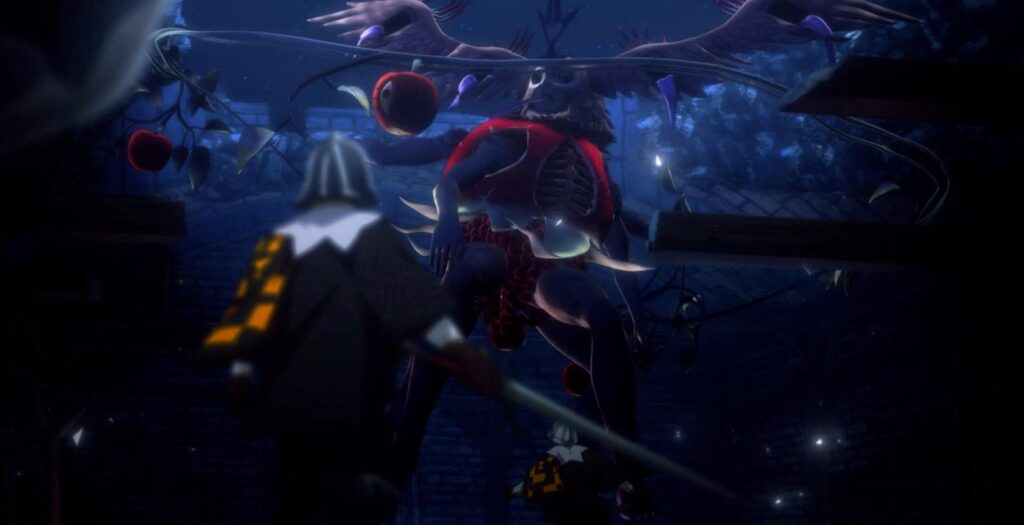
Metaphor offers much more than combat, though. Each new town you’ll visit on this journey has optional dungeons, new social links and bonds to forge, and other ways to spend your day. While traveling between destinations, you and the team will hang out on the Gauntlet Runner – your mobile home base of operations – which allows you to cook and spend time with your team.
The individual moments that unfold throughout the game’s follower stories are successful to varying degrees, largely staying consistent in the messaging Metaphor proposes upfront. However, Catherina’s story feels inconsistent when compared to the rest. It posits a familiar narrative about taking from the rich to provide for the poor. Still, it falls flat and ends up in a spot that feels like it misses the mark on saying anything of value and ditching the idea of revolution for something a bit more flowery and safe. It starkly contrasts the politics and ideas that the game puts front and center.
Metaphor captures the essence of adventure, making the world feel like crafted cogs of a machine all whirring together as they tick along. Traveling from place to place doesn’t feel like disparate ideas for unique settings but rather smaller pieces of the larger whole of Euchronia. Metaphor seamlessly blends the Persona calendar system into the journey, allowing you to plan your days and decide who you want to spend time with. Whether you’re diving deep into one of the game’s many dungeons, having a fireside chat with a trusted party member, or taking a relaxing bath on the back of the Gauntlet Runner, Metaphor’s gameplay loop feels familiar but never stale.
The anxiety of scheduling your days while on the road seems overwhelming at first, but it also peels back its layers slowly over time. Parts of the Gauntlet Runner unlock as the game progresses, giving you room to ease into the rhythm and enjoy the journey along the way. However, you’ll still need to make calculated choices about the best way to use your time.
Each city will unlock optional dungeons, bounties to hunt, and villager requests to complete. You’ll have a deadline for all of them, and maximizing your travel routes and time spent with followers is still a balancing act. It is a balancing act that helps tie all of Metaphor’s systems together in one of the grandest adventures I’ve been on in a long time.
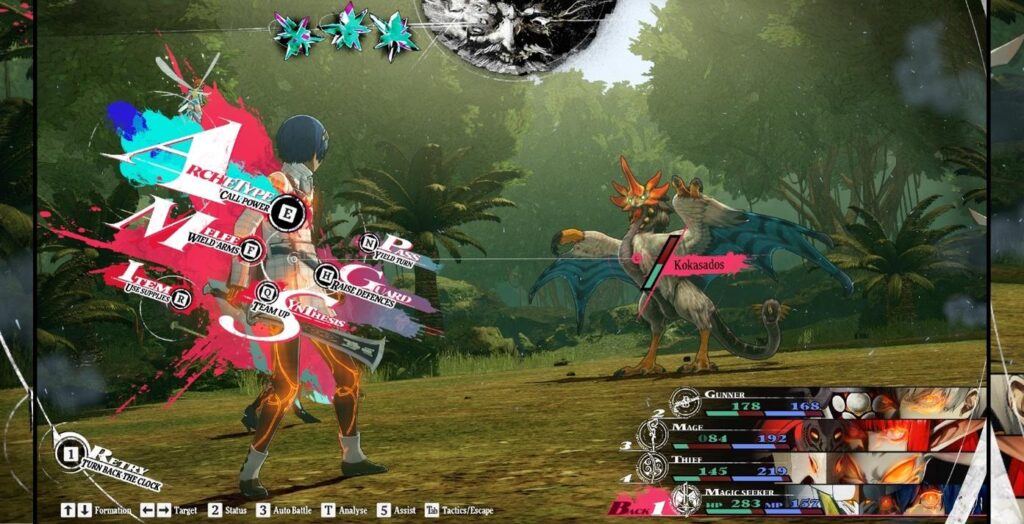
Metaphor is largely a game of moments, scattered blips strung along a timeline filled with the ugliness of a world that doesn’t want us to look at it too closely, lest we see what looks back. In a day and age where people have never been more divided, there’s something comforting in a game that focuses on how we can move forward together.
With all of the political divide and animosity towards one another, Metaphor reminds us that real change isn’t a job for someone else anymore. It takes each and every person to hold politicians accountable and use their voice to make it known. It’s not about settling for a candidate that is the lesser of two evils, but rather one that listens to people’s anxieties and fears and creates a plan of action to address those.
Metaphor’s loftier moments are heightened with an all-new score by Shoji Meguro. The music of Metaphor is drastically different from the lyrical soundtrack you’ve come to expect from Atlus RPGs. The score is focused more on tone setting and offering returning motifs to punctuate important story beats. Its triumphant and bold sound elevates climatic story beats, and its quiet ambiance plays in the background in the game’s slower moments. While it might not be a soundtrack I listen to separate from Metaphor, it’s a noteworthy new direction for the team and something I’m glad exists.
Metaphor: Refantazio is the culmination of everything that came before it. It’s a mixture of Atlus’ RPG track record crafted into something bold and new. It takes stock of the fictional stories Atlus has told in the past and how people have resonated with them for years. It’s really easy to look at these works as escapism; if you do, it’s fine. But I’ve been thinking about how there’s so much more to dissect from these concepts and how when something strikes a chord with you, it gets tucked away into your personal core library for reference for the rest of your life.
So, is fantasy a powerless creation? No, and Metaphor makes a striking case for this over 70 hours. Fictional works like these are directly correlated to the time in which they were made, and if work can unlock something deep within its player or chip away at decades of cynicism, then it’s powerful enough to change the world.
Metaphor: ReFantazio is available now on PlayStation 5|4, Xbox Series X|S, and PC from the creators of Persona.
Metaphor: ReFantazio
-
Rating - 9.5/109.5/10
TL;DR
Metaphor: Refantazio is the culmination of everything that came before it. It’s a mixture of Atlus’ RPG track record crafted into something bold and new. It takes stock of the fictional stories Atlus has told in the past and how people have resonated with them for years.

